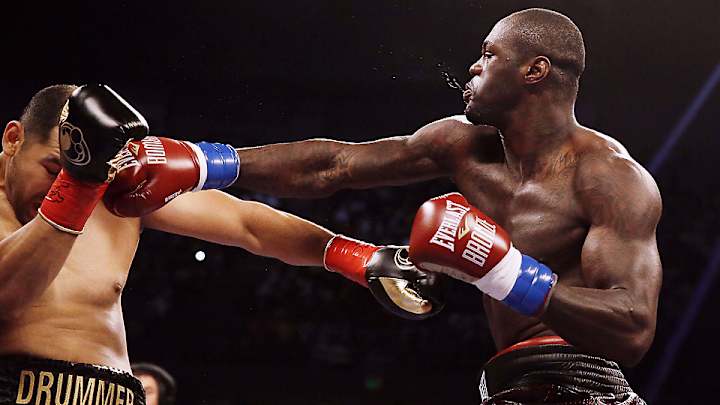Deontay Wilder defends heavyweight belt with 9th-round KO of Eric Molina

BIRMINGHAM, Ala. – Deontay Wilder is in an enviable position. He’s the heavyweight champion, the first U.S. titleholder since Shannon Briggs and the first with a future since Evander Holyfield. He’s popular—witness the 9,347 fans that packed the Bartow Arena on Saturday night. He’s wealthy and well spoken with a crippling right hand and a compelling backstory.
He’s got it all. Well, almost.
Since turning pro in 2008—fresh off a bronze medal performance in the ’08 Olympics—Wilder, 29, has been brought along slowly. One overmatched opponent followed the other, none surviving more than four rounds. He picked up a title—and a truckload of respect—with a strong decision win over Bermane Stiverne, but followed it up with an optional defense against Eric Molina, who was only slightly better credentialed to fight for a world title than the person reading this.
This is Wilder’s next hurdle: Respect. He needs more to recall Holyfield, not Briggs, and to stand in the shoes of Wladimir Klitschko instead of living in the lineal champion’s shadows. Molina won’t get him there. Predictions for Wilder-Molina ranged from one round, 1 1/2, to 1 3/4. Molina beat them, lasting eight-plus, bouncing up from three knockdowns, even wobbling Wilder with a blistering left hook in the third. But he was never in the fight. Wilder (34-0) outworked (303 punches thrown to 188 for Molina) and out landed (141-49) Molina, connecting on a tidy 56% of his power shots.
Look, fighting Molina isn’t a big deal. Wilder earned a homecoming. He fought five months earlier and is on track to fight three times this year. September, he says. More likely, October/November. He sold out the building and proved that Alabama can be for Wilder what Nebraska is for Terence Crawford.
If his next opponent is a Molina-type? That’s a problem.
#http://www.120sports.com/video/v130493186/tough-win-for-wilder
Quietly, the heavyweight division is digging itself out of years of irrelevance. Wladimir Klitschko is still the kingpin, but there are rising stars like Tyson Fury and Anthony Joshua and credible contenders like Bryant Jennings and Alexander Povetkin—who happens to be the mandatory challenger for Wilder’s WBC belt. Opponents—good, TV-friendly opponents—are not hard to find.
Will Wilder fight them? He says he wants to. “I’m ready to fight my mandatory,” Wilder said. On paper, Wilder-Povetkin should be easy to make. Povetkin isn’t part of the messy politics of U.S. boxing. His promoter has deep pockets, as does Al Haymon, Wilder’s manager, who makes all the decisions on his career.
But this is boxing, and what should happen rarely lines up with what does. Wilder-Povetkin should happen this year, either in Alabama or Russia—just ask Klitschko about how much money you can make fighting near the Kremlin. What likely will happen is Wilder will be lined up against Chris Arreola—the ex-title challenger who came in at a doughy 262 pounds in an uninspired win over Curtis Harper last March—or Tony Thompson, the 43-year old gatekeeper. Steve Cunningham and Antonio Tarver—two other aging members of the Haymon Boxing Family—are other options.
Count Wilder’s longtime trainer, Jay Deas, among those that want to see Wilder tested against the elite.
“Once you are at this level, you fight everyone,” Deas said. “Not doing it is like going into the playoff in college football and saying ‘Oh, no, we don’t want to play them.’ You’re there now.”
This is where Wilder can exert some pressure. He can make money fighting anyone (he earned $1.4 million against Molina) but to earn respect means fighting a worthy opponent. He’s in the prime of his career and can dare to be great and make U.S. boxing fans say “American heavyweight” without giggling. He can demand Povetkin, Jennings or Joshua. He has power. He just has to use it.
Standing at a podium late Saturday night, sweat still beading on his brow, Wilder chastised the media for criticizing his choice of opponent. It’s not unusual. For fighters, its become boilerplate. You never stepped in the ring, they say, as if field experience was ever a job criteria. Like fans, writers want relevance, to see the best fight the best. It’s the only way to dig boxing out of the outskirts, to restore its place in the mainstream.
Wilder has an opportunity. Everyone, fans and media alike, hope he takes it.

Chris Mannix is a senior writer at Sports Illustrated covering the NBA and boxing beats. He joined the SI staff in 2003 following his graduation from Boston College. Mannix is the host of SI's "Open Floor" podcast and serves as a ringside analyst and reporter for DAZN Boxing. He is also a frequent contributor to NBC Sports Boston as an NBA analyst. A nominee for National Sportswriter of the Year in 2022, Mannix has won writing awards from the Boxing Writers Association of America and the Pro Basketball Writers Association, and is a longtime member of both organizations.
Follow sichrismannix